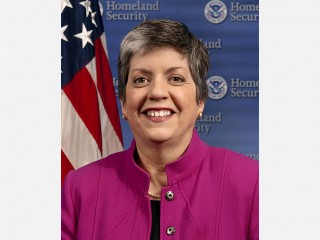
Janet Napolitano biography
Date of birth : 1957-11-29
Date of death : -
Birthplace : New York City, New York, U.S.
Nationality : American
Category : Politics
Last modified : 2010-06-24
Credited as : Politician and attorney, U.S. Secretary of Homeland Security, Obama administration
2 votes so far
Janet Napolitano is the U.S. Attorney for the Arizona district, but is probably better known as a member of the legal team created to represent Anita Hill during her testimony to the Senate Judiciary Committee in October 1991, in which Hill detailed lurid and gripping allegations of sexual harassment by then-Supreme Court nominee Clarence Thomas. Before the notoriety caused by this incident, Napolitano was a well-connected Democratic activist attorney. She was the first woman to hold the number-two position in the Arizona Democratic Party and has long worked in the political arena. After law school she clerked for Judge MarySchroeder of the 9th Circuit Court of Appeals, and after her clerkship she took a position with the Phoenix law firm of Lewis & Roca, where she specialized in appellate and commercial law.
John Frank, an associate of Napolitano's at Lewis & Roca, was the partner responsible for bringing her to Washington to serve on the Anita Hill team. A former Yale law professor, Frank had earned national prominence in 1964 when he argued the landmark Miranda case before the Supreme Court. He is also widely credited with organizing the opposition to Robert Bork's nomination to the Supreme Court. As part of the Hill team, Napolitano acted as the law professor's counsel during meetings, which were arranged prior to her testimony by Judiciary Committee staff members. That this small role has continued to define Napolitano has caused her considerable irritation. A small scandal erupted the next year when Dennis DeConcini, Arizona's senior senator, nominated her to be U.S. Attorney for Phoenix. Napolitano responded that her representation of Hill had been "a four day representation in a ten year career."
Still, many Republicans were loathe to let her forget the role she'd played in the Hill-Thomas hearings. David Brock, a writer for the ideologically driven magazine the American Spectator, led the campaign to block Napolitano's nomination, suggesting in a lengthy article that Napolitano had coached Hill to commit perjury in a meeting prior to her testimony. After publication of the story, which was filled with what was later shown to be inaccurate reporting by Anthony Lewis of the New York Times, among others, Napolitano's confirmation was delayed, even though it had been approved by the Senate Judiciary Committee--the body ultimately responsible for oversight in this area. Two Republican Senators sent Napolitano a written list of 91 questions regarding her handling of the Hill-Thomas affair. While Napolitano answered all the questions to the satisfaction of the vast majority of the Senate, some members wanted her to reveal the nature of a private lawyer-client conversation she had with one of Anita Hill's witnesses--an ethical violation Napolitano refused to accommodate. In his op-ed piece in the Times, Anthony Lewis questioned David Brock's motives for stirring up the then two-year-old scandal. "By attacking Ms. Napolitano, David Brock has abandoned the pretense that he is an impartial investigative reporter. He is a hatchetman for the far-out right."
Napolitano's nomination was ultimately approved. However, she was once again drawn into the national spotlight by Republican ideologues looking to make headlines. In 1996, as Republican presidential nominee Bob Dole's campaign found itself struggling in the polls, the former Kansas senator began searching through the records of Clinton appointees. He found that in January of that year, Janet Napolitano, as acting U.S. Attorney in Phoenix, had refused a request by the U.S. Postal Inspection Service (USPIS) to grant a warrant to search the home of a suspected consumer of child pornography. The warrant was later issued by a state judge, and the man was arrested and admitted to having had sex with underage boys. In May of that year, ABC news ran a story suggesting that Napolitano had refused to issue the warrant because she was sympathetic to homosexuals, an accusation she characterized as "fundamentally offensive" at a press conference the day after ABC aired the story. Napolitano's office was scandalized by the report and issued a response indicating that in ten requests for search warrants involving child pornography, Napolitano had issued nine--eight of which involved homosexual pedophilia.
When Bob Dole heard of the story he tried to make it an issue. As Newsweek reported, when the campaign heard of the scandal, "Dole himself demanded the Attorney General Janet Reno explain the Arizona prosecutor's 'shocking' conduct." The U.S.Justice department came to Napolitano's defense, however, calling Dole's allegations "tabloid trash and twaddle." The next week, having created a small furor, Dole moved on to attack another Clinton appointee, the U.S. Attorney in San Diego. Hearings were never held on the Napolitano case.
In 1999, Napolitano was appointed Attorney General for Phoenix, Arizona. She was one of the five female candidates who made history because it was the first time any state had voted in an all-female executive branch.
PERSONAL INFORMATION
Born November 29, 1957, daughter of Leonard Michael and Jane Marie (Winer) Napolitano. Education: B.S., University of California, Santa Clara, 1979; J.D., University of Virginia, 1983. Addresses: Office--U.S.
AWARDS
Truman Foundation Scholar, 1977.
CAREER
Law clerk, 9th Circuit, U.S. Court of Appeals, 1983-84; Partner, Lewis & Roca, 1984-93; U.S. Attorney, Phoenix, AZ District, 1993-1999; Attorney General, Phoenix, AZ District, 1999---.
















